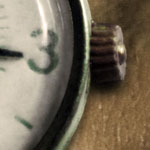Time Traveler

When I was a lad I had a watch that was five minutes behind. Setting that watch at the beginning of each school day was part of my morning ritual, followed closely by the familiar litany: key, money, watch, belt, pencil. They were essential to my peace of mind, and had to be on my person before I set out for school.
Finding myself without any one of these five things foretold some amount of additional hardship. Without the key I would be locked out of the house until my parents’ return, very late. Without money there would be no lunch. No watch meant I couldn’t tell how much longer I had to bear class without turning around in my seat toward the clock on the back wall, an act sure to draw the attention of my instructor. My belt provided not only a sense of security, but was the most efficient means of keeping my big brother’s pants on my hips. And without a pencil, my instructor—my vengeful instructor—would force me to take notes using a sharpened fingernail in fiber-board. Or so I had heard. I didn’t wish to find out.
Key, money, watch, belt, pencil. What set these few items apart as being so deserving of conscious daily attention? After all, weren’t there any number of things whose absence I would more sorely regret? But that’s the key: these were the things at the center, between mere whim and necessity. These were the five things that I desired, but only for comfort. I was never in danger of forgetting the things I didn’t need, like candy or glue balls. And I couldn’t forget the truly essential gear, like my books, my underwear, or the tiny, ivory-handled pistol I wore in them.
For the most part there was a sanctity to my routine that gave me a sense both of control and belonging. Perhaps that was the closest I ever came to realizing the notion of celestial clockwork. Maybe it’s ironic then that I grew to loathe the setting of my watch. Its unwillingness to stay where I set it seemed mocking, especially as it ran no more slowly than any of the other timepieces in my life. It was just five minutes behind, and there it stayed. I became obsessed with synchronizing it, whenever I took notice of the disparity. But by the end of a day it would be five minutes behind once more.
Looking at the matter technically, it would have been an easy matter to ascribe this to a faulty time-keeping mechanism. But the fact—no the beauty—of my watch was that it would not be ten minutes slower if I let two days lapse between settings. No, from a scientific perspective I had to concede that my watch would decelerate, upon its initial setting, until it was five minutes to the lee of the correct time, at which point it would resume normal speed. Just enough to maintain its place.
As children we cling to the things we know, little moral absolutists that we are. As such, it is clear that there is a right time and a wrong time. It’s as binary as that. Thus do we suffer any divergence from the known universe, and tattle or weep so that we might realize salvation from some greater authority. My instructor saw none of this struggle however, as I had learned early on that to be hysterical and frenzied was to be vulnerable.
I was just twelve then, but already setting my watch every six minutes or so. My state of mind was beginning to affect not only my assignments, but my well-being, and my conduct was visibly affected. By then I believed that my watch was leading me astray. It doesn’t take more than five minutes to be called mad, or worse. Try it yourself: respond to your friends consistently five minutes late, or step off the curb five minutes early. You’ll begin to see that life can take a nasty turn without any of its individual components changing. In the end it’s just a matter of timing.
My vindictive instructor ordered me to turn around, to stop looking at the clock on the back wall, and, when I failed to follow his directive, grabbed my shoulders and turned me physically. “You face forward,” he said, standing over me like a chalk dust-coated pylon. I admit that I was not man enough to bear the humiliation. When the bell rang only a minute later, and the kids piled out like apples off a tipped cart, I sat at my desk for four more minutes. Finally I was still, but that wasn’t good enough for my instructor. It’s a matter of timing, you see. By then he was shaking my shoulder and yelling in my ear, “Are you okay? Hey, can you hear me?” Then I pulled out my pistol and gave him something to yell about.
That wasn’t as long ago as you might imagine, yet things in my life have changed drastically. I’ve found much solace in a more regimented lifestyle, but I’m looking forward, in the near future, to establishing my own routines again. Once I am released. Key, money, watch, belt, pencil. License. Cigarettes. Glasses. Medicine.
As a final note I must say that I have to stifle a laugh whenever mention is made of the “time” I must serve. I’m ahead of the game is what they don’t realize. Five minutes ahead, to be precise.
Related Tales
» “Name of the Game” (31 of Oct, 2005)
» “Social Mirror” (12 of Oct, 2004)
» “A Thousand Cuts” (27 of Jul, 2004)